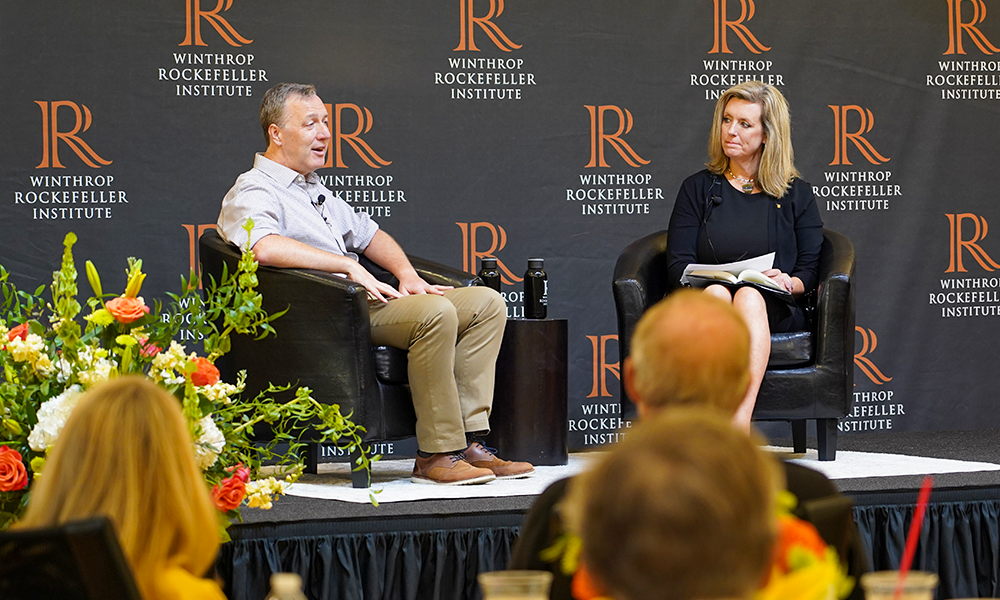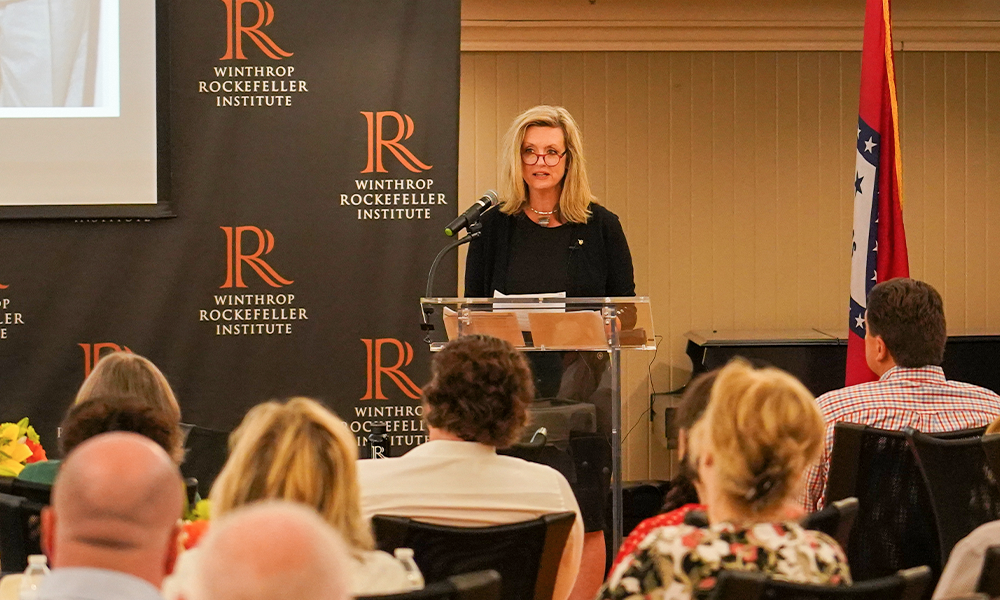by Janet Harris
The following is an excerpt from a speech delivered by the Institute’s Executive Director/CEO, Janet Harris, during a book event celebrating Dr. John Kirk’s new biography of Winthrop Rockefeller. In her speech, Janet reflects on her professional and personal history with Arkansas politics, and how the Institute works to continue the legacy Winthrop left behind after serving as governor of this state for two terms.
Given that my education as a young adult took place in the halls of Arkansas’s State Capitol, I thought I knew Winthrop Rockefeller’s story and I knew, as many Arkansans did, some of the more oft-repeated hallmarks of his legacy, both political and philanthropic.
I had heard about the jaw-dropping innovations in cattle farming that he demonstrated here on Petit Jean, and stories from people who remember visiting this place when they were young, or working here and benefitting from his generosity.
I had learned how he stepped up to rebuild a two-party system in Arkansas by taking on the Faubus political machine and how he’d brought a new era of transparency and professionalism to state government, an institution in which I was proud to serve.
I had heard the stories of prison reform and his commitment to improvements in education.
I had seen the photos and heard the speech from when he stood on the steps of the Capitol to memorialize Dr. Martin Luther King, Jr. and his deep hope for better race relations in the South.
I had gotten at least a surface-level glimpse of his determination to bring about advances in mechanization and industrialization so that we could strengthen our economy as a state.
I had seen, over and over, the products of his philanthropy and the work that continued because of it. Winrock International, the Winthrop Rockefeller Foundation, the Arkansas Arts Center, the Arkansas Community Foundation, the model school in Morrilton, and countless other investments that made a difference in my home state.
I had had the privilege of working in the Capitol and of meeting Lieutenant Governor Win Paul Rockefeller, who was following in the footsteps of his father, a man he described as a thoughtful giver, and who taught him that the greater one’s gifts in the world, the more one is obliged to do.
“Rockefeller was never one to simply write a check. Rather, he helped his fellow citizens turn their ideas into plans and provided them with resources to put their plans into action.”
John Ward
My first deep dive into Winthrop Rockefeller’s philanthropy was courtesy of my predecessor, Dr. Marta Loyd, who reminded me that philanthropy is not about donating money. It is about giving for the benefit of people. Indeed, the word philanthropy has as its root meaning: “the love of humanity.”
Marta was the one who reminded me that Winthrop Rockefeller himself taught us that “It is not enough to contribute money. People must make a gift of themselves, of their own time, their creative talent and spiritual strength” for the benefit of others, for the benefit of a more just and better world.
Winthrop Rockefeller’s 20 years under the microscope in Arkansas taught us a lot about who he was. The stories and his accomplishments were… incredible.


A Continuing Legacy
Winthrop Rockefeller’s continuing legacy is the creation of transformational change. If we are to continue to make a difference in the world around us, it is useful to understand what transformational change is, and the values and attributes that are needed for us to take up the mantle of positively transforming the world around us. But a warning! If we are to do this, it will require energy and enthusiasm. The giving, as Winthrop taught us, of our time, talent, and spiritual strength.
But what is transformational change, exactly?
Winthrop Rockefeller transformed this mountaintop into a home, a thriving, magnificent cattle ranch, and a community of people who made all of those things run. When he had built Winrock Farms, he began to invite people to come and see it and extended the very best hospitality to all of his guests. This is part of his continuing legacy that we continue today.
But as he dug more deeply into the problems of our state, and became more enthusiastic about our opportunities, he began to invite people to convene on the mountain.
Over and over he called together groups of people, who he encouraged to be thoughtfully concerned about the world around them.
He challenged them to change things by looking outside of old structures and old ways of thinking. He convened people to mobilize them and encourage them to collaborate for the benefit of the whole state.
He saw possibilities in economic development that he knew could ONLY be accomplished through collaboration with Governor Orval Faubus, someone whose politics were very different from his own and someone with whom he says he disagreed on many things.
But in acknowledging the difficulty of collaboration, he said, “I hope that I will never reach a time when I will not be able to work with people whom I disagree with if we can reach a common goal by doing so.”
Winthrop Rockefeller’s continuing legacy is that he modeled for us that we CAN work together even when we disagree, even when the person with whom we are collaborating has a different view of the world than we do.
The Winthrop Rockefeller Institute continues bringing people together in this place to do this work. Our vision is that every person will be empowered to bring their unique perspective to bear on our most important challenges and search for solutions together in this place, as Winthrop Rockefeller did when he lived.
The Institute Today
Over the last seven years, our Institute programs have convened nearly 4,000 people in search of solutions to issues ranging from obesity, entrepreneurship, rural health care access, scientific research collaboration, community development, rural physician recruitment, agricultural technology, and civic engagement. Today we have three collaboratives that are actively working, across diverse viewpoints, to search for solutions to systemic challenges in recidivism, K-12 education, and health equity.
These programs create space for all voices to be heard in deliberation and dialogue. They foster mutual understanding and connections between siloed organizations and communities. They demonstrate effective methods of collaborating and provide paths forward with action plans that are thoughtfully conceived and agreed upon by participants giving of their time, talent, and spiritual strength. Our programs demonstrate the power of the Rockefeller Ethic.
When we are not convening, we are helping organizations on and off the mountain have thoughtful, productive conversations and reach the outcomes they hope to achieve when they convene. We are using the Rockefeller Ethic to help people work better together.
Outside of our programs, we host workshops designed to help people learn how to collaborate effectively, how to communicate across divides, how to structure purposeful meetings, how to strengthen their teams, and how to examine their own leadership values through the lens of Winthrop Rockefeller’s story.
Finally, in the past 7 years over 47,367 people have convened their conferences on the mountain from public, private, and third sector organizations. They come here for the special energy of the mountaintop where they connect and form relationships, write plans, engage in continuing education, and generally take a step back from their daily work to see the bigger picture.
And all of those people who convene here enjoy our signature hospitality. Because we know that we are continuing a long tradition of convening and hospitality that started with Winthrop Rockefeller. It is his legacy that continues in this place today.
Our people. Our place. Our process. It is how we hope to create transformational change in the world and continue the legacy of Winthrop Rockefeller in years to come.


Dear Janet,
You are an incredible messenger in promoting the Legacy of Winthrop Rockefeller; this speech is a shining example. I don’t agree with much John Ward had to say but your quote from him was absolutely right on! As you are aware, the Winthrop Rockefeller Legacy is personal to me and I am very proud of you and the leadership you are providing.
Marion Stevenson